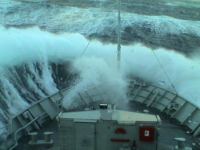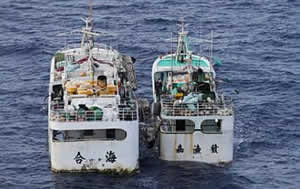The sustainable use and conservation of the oceans is an objective recognised in the United Nation’s Agenda for 2030, as part of an overarching commitment to protect the planet from destructive production and consumption patterns.[1] The Agenda for Sustainable Development is a declaration establishing 17 sustainable development goals (SDGs), and 169 associated targets that are meant to build on previous sustainable development commitments of the UN, and specifically address the unmet objectives of previous international sustainability agendas.[2]

The 2030 Agenda for Sustainable Development is global and aspirational, and is meant to be universally applicable. It has overarching objectives, namely the eradication of poverty and the realisation of a sustainable and resilient world with human rights at its centre.[3] In line with its broad objective to eliminate poverty, it addresses fisheries sustainability as an antidote to food insecurity and underdevelopment.[4] The sector’s sustainability is critically important to human wellbeing: around 12% of the world’s population depends on fisheries and aquaculture for work, and the sector supplies 17% of animal protein in human diets.[5] In addition, fisheries is strongly supportive of satellite economic sectors, particularly in developing island States.[6]
The role of fisheries in development is highlighted in SDG 2, but the prioritisation of policies for the sustainable use and conservation of the oceans is underlined by the adoption of an entire and ambitious goal, SDG 14. The goal is directly relevant to fishery production and utilisation, and to the improvement of fisheries institutions. For the purposes of IUU fishing control policies and their relationship to specific legal regimes, the following aspects of SDG 14 are important:
14.4 By 2020, effectively regulate harvesting and end overfishing, illegal, unreported and unregulated fishing and destructive fishing practices and implement science-based management plans, in order to restore fish stocks in the shortest time feasible, at least to levels that can produce maximum sustainable yield as determined by their biological characteristics.
14.6 By 2020, prohibit certain forms of fisheries subsidies which contribute to overcapacity and overfishing, eliminate subsidies that contribute to illegal, unreported and unregulated fishing and refrain from introducing new such subsidies, recognizing that appropriate and effective special and differential treatment for developing and least developed countries should be an integral part of the World Trade Organization fisheries subsidies negotiation.
14.c Enhance the conservation and sustainable use of oceans and their resources by implementing international law as reflected in the United Nations Convention on the Law of the Sea, which provides the legal framework for the conservation and sustainable use of oceans and their resources, as recalled in paragraph 158 of “The future we want”.
SDG 14 is designed to work as a catalyst for the convergence of relevant governance strategies.[7] Specifically on the issue of the eradication of IUU fishing, SDG 14 situates targets in two interrelated but distinct contexts: On the one hand, the attainment of fairness in global trade through the regime of the World Trade Organisation (WTO), and the eradication of detrimental subsidies.[8] Secondly, the sound and accountable governance of natural resources as the underpinning to just societies at a global level.[9] It is in this second context that SDG 14.4 sets a target to end IUU fishing as part of the commitment of restoring fish stocks to maximum sustainable yield (MSY) levels by 2020. SDG 14.c specifically links this objective with the requirement to implement international law, as reflected in the United Nations Convention on the Law of the Sea (UNCLOS), which provides the legal framework for the conservation and sustainable use of oceans. Allegiance to UNCLOS and its satellite treaties is therefore at the core of SDG 14, and all States with an interest in the sustainable management of living marine resources ought to prioritise ratification or accession, and domestic implementation. Further, they should clearly outline their commitment to UNCLOS in the context of international cooperation.
Finally, IUU fishing is one of the intractable problems of our time, and its complexity must not be underestimated. It both impacts and is impacted by corruption and poor governance, lax implementation of international law and global policy objectives, underdevelopment and marginalisation, and a lack of participation of the appropriate stakeholders in conservation, management and compliance policies. Hence, the objectives of SDG 14 must not be considered in isolation. The following are also relevant:
Goal 10. Reduce inequality within and amongst countries:
10.6 Ensure enhanced representation and voice for developing countries in decision-making in global international economic and financial institutions in order to deliver more effective, credible, accountable and legitimate institutions.
Goal 16. Promote peaceful and inclusive societies for sustainable development, provide access to justice for all and build effective, accountable and inclusive institutions at all levels:
16.6 Develop effective, accountable and transparent institutions at all levels.
Target 16.6 inherits part of the meaning of Principle 10 of the 1992 Rio Declaration, whereby it is recognised that environmental issues are best handled in a manner that permits participation by members of the public. This principle led to the adoption of the 1998 ECE Aarhus Convention.[10]
Goal 17. Strengthen the means of implementation and revitalize the Global Partnership for Sustainable Development data, monitoring and accountability:
17.18 By 2020, enhance capacity-building support to developing countries, including for least developed countries and small island developing States, to increase significantly the availability of high-quality, timely and reliable data disaggregated by income, gender, age, race, ethnicity, migratory status, disability, geographic location and other characteristics relevant in national contexts.
17.19 By 2030, build on existing initiatives to develop measurements of progress on sustainable development that complement gross domestic product, and support statistical capacity-building in developing countries.
Mercedes Rosello, October 2016.
References:
[1] United Nations General Assembly (UNGA), ‘Transforming our World: The 2030 Agenda for Sustainable Development’ (2015) A/Res/70/1.
[2] Report of the United Nations Conference on Environment and Development, Rio de Janeiro, 3–14 June 1992, vol. I, Resolutions Adopted by the Conference (United Nations publication, Sales No. E.93.I.8 and corrigendum), resolution 1, annex I. 2012 Rio +20 Conference ‘The Future We Want’, which culminated in the adoption of a Resolution for, amongst other objectives, the adoption of the Millennium Development Goals. Report of the International Conference on Population and Development, Cairo, 5–13 September 1994 (United Nations publication, Sales No. E.95.XIII.18), chap. I, resolution 1, annex.7. Report of the Fourth World Conference on Women, Beijing, 4–15 September 1995 (United Nations publication, Sales No. E.96.IV.13), chap. I, resolution 1, annex II.
[3] UNGA Res 70/1, Preamble.
[4] UNGA Res 70/1, para 24.
[5] FAO SOFIA 2016, pp. 81.
[6] Ibid.
[7] FAO SOFIA 2016, pp 82.
[8] UNGA Res 70/1, paras. 27 and 30.
[9] UNGA Res 70/1, paras 33 and 35.
[10] Freestone, D ‘Problems of High Seas Governance’ in Vidas D and Schei PJ (Eds) The World Ocean in Globalization: Climate Change, Sustainable Fisheries, Biodiversity, Shipping, Regional Issues (2011) 127.

















You must be logged in to post a comment.